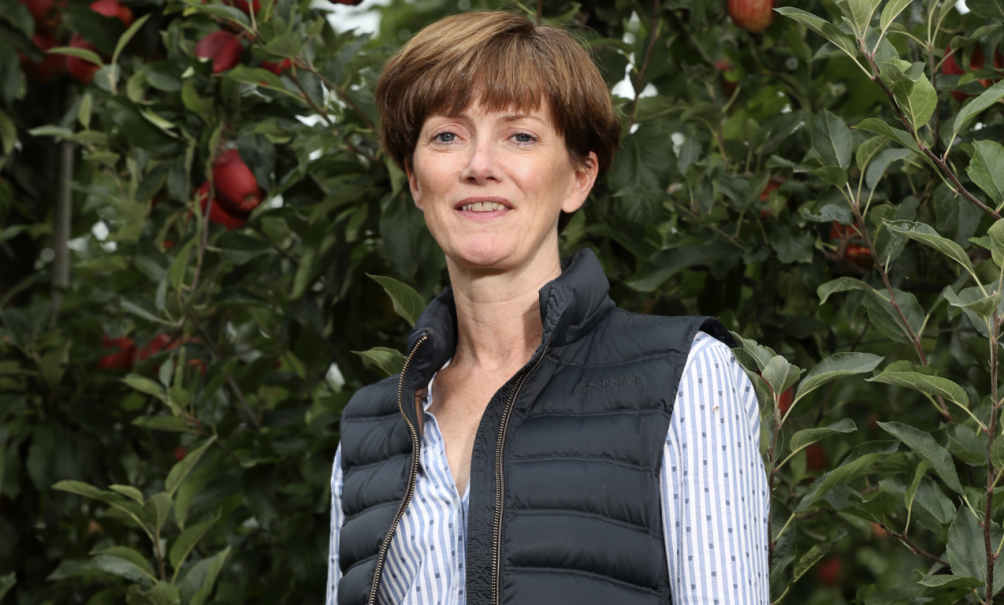Take rose-tinted spectacles off to stop British agriculture going pear-shaped
15th August 2024 by OFC Press Team

As she enters her final term as a Director of the Oxford Farming Conference (OFC) fruit and hop grower Ali Capper says nostalgia about agriculture needs to be left at the farm gate and replaced with a more businesslike mindset.
She has also broadly welcomed the new Government, saying Sir Keir Starmer’s cabinet seems to offer “good potential” for investing in growth and showing a “more common sense” outlook towards seasonal workers, proven to be vital for the UK’s harvest, especially in the fruit and vegetable sector.
The Migration Advisory Committee - independent advisers to the Government on immigration matters - has echoed years of industry lobbying on the importance of the Seasonal Workers Scheme (SWS) and its recently released review report calls for more certainty and clarification on visa numbers, echoing the National Farmers’ Union’s call for a rolling five-year programme.
“A move away from a hard right immigration policy is very welcome,” explained Ms Capper. “This new Government’s outlook towards seasonal labour seems much more common sense. The bottom line is we can’t pick fruit and vegetables without hands and anything that makes getting those workers out in the field must be good news.”
Generations of Secretaries of States and Shadow Ministers have seen the OFC as a must-attend platform to address the agricultural industry. Defra Secretary Steve Reed already has one under his belt, visiting in January while still in opposition.
In a similar vein to her comments on seasonal labour, Ms Capper - who is a director of her family’s fruit and hop farm in Worcestershire as well as being an NFU Mutual Board member and chair of British Apples and Pears - will be pushing for the new administration to “sort borders out” as well as “the UK’s relationship with the EU.”
“The border operating models we have at the moment are not working and it needs sorting out to encourage growth in trade,” she says.
Britain is currently only 40% self-sufficient in apple and pear production.
“There is no reason that with the right investment from our new Government - be that through grants, tax incentives, accessibility to labour and research and innovation investment - that this couldn’t rise to 60% or 70% or even double to 80%. We just need that investment in growth.”
Ms Capper first attended the Oxford Farming Conference - which next takes place between January 8th to 10th 2025 - when she was invited to speak in 2017.
“I just turned up and hadn’t given it much thought to be honest,” she recalls. “I had no idea of the scale of the event and became a fan. The 2025 conference will be the last in my term as a director and, for me, this is one of the best things about the whole event. Every year there are three new Directors and three stepping aside which means the conference never gets stale, it’s always inspiring. Whatever changes come and go OFC always gives people the opportunity to have a voice and ask questions, which is vital.”
On the subject of the farming industry’s voice Ms Capper is adamant that if British agriculture is serious about securing investment it needs to present itself in a more businesslike fashion.
“My sector of farming has been largely unsubsidised through the Basic Payment Scheme (BPS) and has had to plough its own furrow through challenges such as covid and the recent unprecedented inflation. Profit is not a dirty word, and this is something that government needs to recognise across all farming sectors. The bottom line is if you are not making a profit, you can’t reinvest in growing your business.
“Farming is rightly proud of its history and heritage but to remain viable it needs to take its rose-tinted spectacles off about the past and focus on the future.”
OFC Chair, Geoff Sansome, said “it will be interesting” to see which of Ms Capper’s asks are acted upon, adding that he will be keenly watching what the new Labour administration’s Cabinet Secretary achieves in his first 100 days in office.
“Steve Reed spoke back in January at OFC 2024 and said that ‘food security is national security’ and has also recently committed to continuing with Environmental Land Management incentives.
Geoff adds “there is a more nuanced debate to be had about food security, where in many sectors we are well supplied, compared to other sectors such as fruit and vegetables where there is an opportunity to improve. It’s not as simple as increasing self-sufficiency across the board. We have many competing government priorities for land use; food production, energy and housing being the major ones. We need a government that will back our farmers, provide a framework to inform those competing demands for land use, but not back track from the environmental incentives that will help deliver for biodiversity, clean air and water which underpin food production and deliver for climate change.
“The OFC is one of those rare places where Ministers can be held to account for their promises within an audience that is leading the sector, a network of influential people that will keep asking for change if they don’t see it forthcoming. The conference delegates really do represent the ‘who’s who’ in British agriculture, which is why Ministers, and their shadows always welcome the chance to address our event.”
The Oxford Farming Conference will take place from January 8th to 10th 2025, tickets are now on sale here
